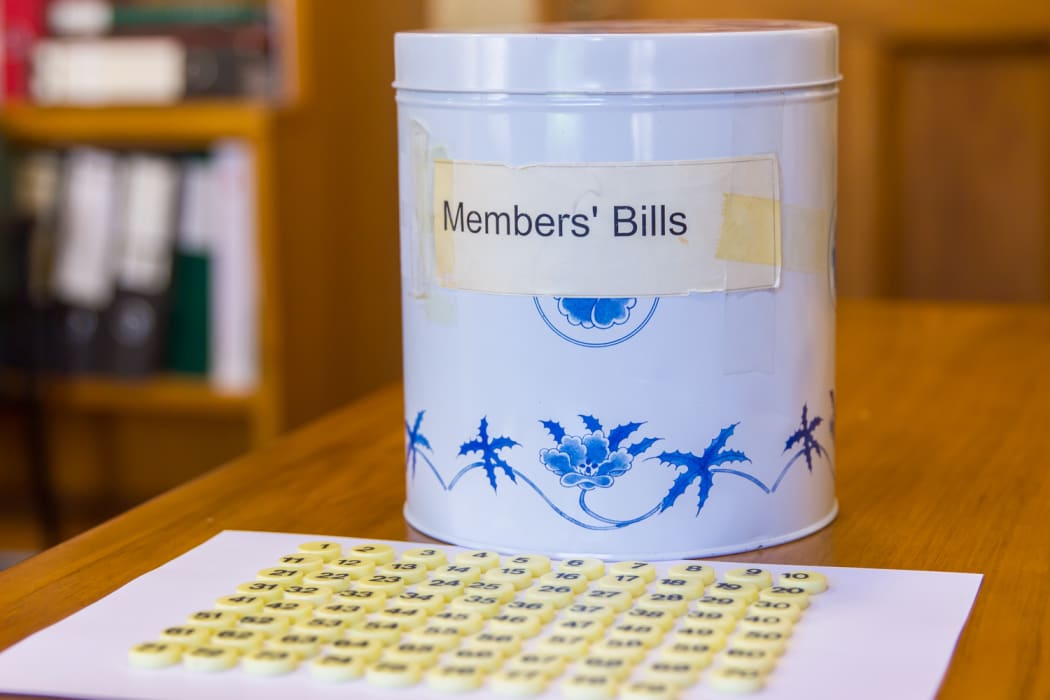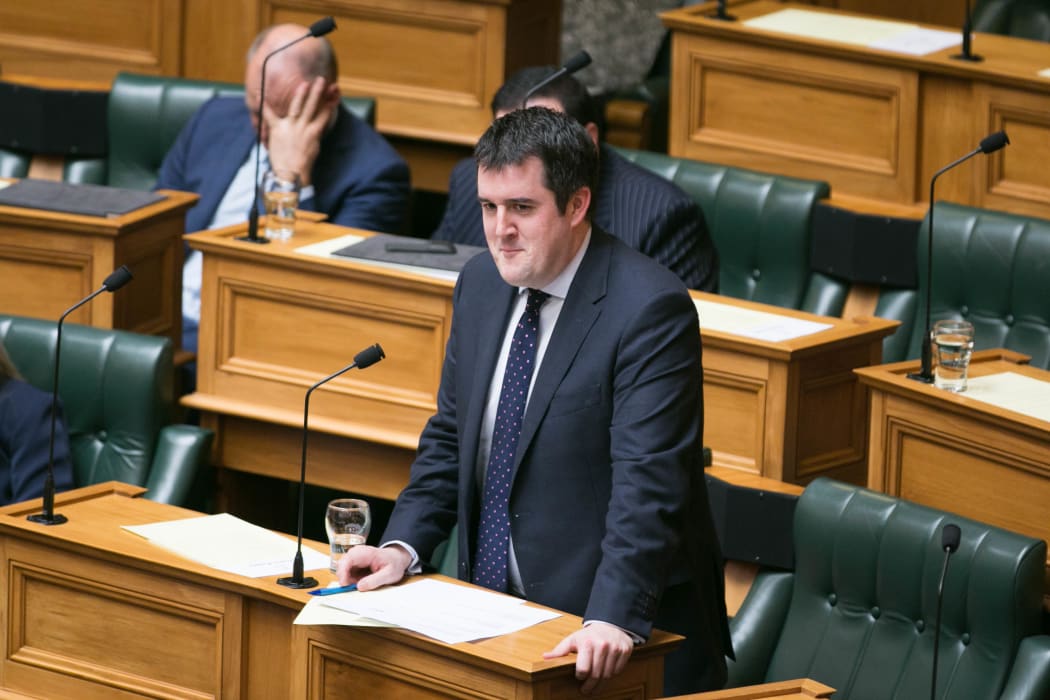Kiwisaver for foster children, quicker sentencing for dog related offences and random oral fluid testing of drivers for MDMA, THC and Methamphetamine.
These are some of the topics up for debate this week but they’re not put forward by the Government.
Alternate Wednesdays in the House are members’ days which is when bills from MPs who are not ministers are debated.
Many of the most well-known laws come from Member’s Bills, because they are often how MPs propose a controversial change like homosexual law reform in 1986, decriminalising prostitution in 2003, and legalising same sex marriage in 2013.
It’s a gamble as to whether a member’s bill will be debated: they’re drawn out of a biscuit tin (yes, really) so an MP needs a bit of luck on their side to get their legislation to the House.

Each member's bill is given a number which is then put into this biscuit tin. MPs often watch the ballot to see if their bill will be drawn. Photo: Supplied / Office of the Clerk
Labour MP for Te Tai Tonga Rino Tirikatene is one of those politicians who got lucky and his bill on entrenching Parliament's Maori seats was on the list to have its first reading debate in the House.
“It’s about giving equal status to the Maori seats, equal protection in the house,” he said.
“At the moment general seats can only be abolished by way of a special majority of the House whereas Maori seats do not have the same protection, they are vulnerable to a simple majority.”
Under the Bill either a simple majority in a public vote or at least 75 percent of MPs would be needed to get rid of the seats. Mr Tirikatene said the bill will give equal status and legal protection to Maori seats.

Labour MP Rino Tirikatene is chair of the Māori Affairs Select Committee Photo: VNP / Daniela Maoate-Cox
“I don’t see any reason why there should be a differing status between general seats and Maori seats.”
“This is a long running issue, there have been four bills prior to mine with a similar kaupapa but I’m the lucky one that’s had mine plucked out of the tin.”
He doesn’t see it as a political party issue.
“I see this as a Treaty issue and a constitutional issue. The Maori seats have been a world-leading model of indigenous representation for our country, they’ve been around for 150 years this year and they do embody the Treaty partnership.
“They are what makes our democracy special,” he said.
On the opposite side of the House National MP Chris Bishop also has a bill up for debate.

National Party MP Chris Bishop Photo: VNP / Daniela Maoate-Cox
Mr Bishop’s member’s bill on compensation for live organ donors was passed in 2016 but his role as National’s police spokesperson has yielded a bill on a different topic.
“It changes the law to make it clear that if you’re a gang member you’re not entitled to a firearms licence. If you’re in a gang you cannot get a firearm,” he said.
The Bill’s official name is the Arms (Firearms Prohibition Orders) Amendment Bill and it will also make a change to police powers.
“It allows the Commissioner of Police to place firearms prohibition orders on people who are members of gangs who have a history of violent offending or who have a history of firearms licence breaches”.
The police would have wider powers to search a property (including vehicles) and seize a firearm owned by a person with a prohibition order he said.
About 600 people would be subject to a prohibition order estimates Mr Bishop and he said the law change is a recommendation that came out of the Law and Order select committee from the last Parliament.
“The last Government endorsed that recommendation, that was the last National Government, now we’re in opposition we’ve lodged this into the Members’ Bill ballot and hope it will get parliamentary support.”
Mr Bishop said similar legislation exists in other jurisdictions including three states in Australia and this bill is based on those laws.
Other members’ bills up for debate include:
-
KiwiSaver (Foster Parents Opting in for Children in their Care) Amendment Bill (first reading) in the name of National’s Hamish Walker will allow a foster parent (or kin carer) to open a kiwisaver account for a foster child in their care.
-
Dog Control (Category 1 Offences) Amendment Bill (first reading). This Bill (in the name of Ian McKelvie - National), would allow most dog-related offences that can’t result in a prison term to be heard by Justices of the Peace (JPs) and Community Magistrates (rather than judges) to speed up their processing. The Bill gives increasing animal welfare (via less time spent in the pound) as the purpose.
-
Land Transport (Random Oral Fluid Testing) Amendment Bill will have its first reading. This will let enforcement officers to do random oral fluid tests on drivers for THC, MDMA, and Methamphetamine.
-
Protection for First Responders and Prison Officers Bill (first reading). The Bill in the name of New Zealand First MP Daroch Ball, would bring in a minimum sentence of six months imprisonment for someone who injures a first responder or prison officer with intent. The sentence will not apply if the court considers it to be manifestly unjust.
You can see how the Bills did on Parliament's website: Daily Progress in the House


